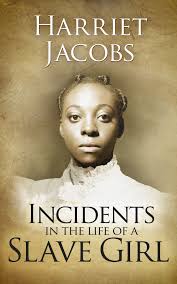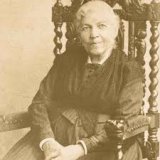Incidents in the Life of a Slave Girl Page #21
Incidents in the Life of a Slave Girl, written by herself is an autobiography by Harriet Jacobs, a mother and fugitive slave, published in 1861 by L. Maria Child, who edited the book for its author. Jacobs used the pseudonym Linda Brent.
My grandmother had a large trunk of bedding and table cloths. When that was opened, there was a great shout of surprise; and one exclaimed, "Where'd the damned niggers git all dis sheet an' table clarf?" My grandmother, emboldened by the presence of our white protector said, "You may be sure we didn't pilfer 'em from your houses." "Look here, mammy," said a grim-looking fellow without any coat, "you seem to feel mighty gran' 'cause you got all them 'ere fixens. White folks oughter have 'em all." His remarks were interrupted by a chorus of voices shouting, "We's got 'em! We's got 'em! Dis 'ere yaller gal's got letters!" There was a general rush for the supposed letter, which, upon examination, proved to be some verses written to me by a friend. In packing away my things, I had overlooked them. When their captain informed them of their contents, they seemed much disappointed. He inquired of me who wrote them. I told him it was one of my friends. "Can you read them?" he asked. When I told him I could, he swore, and raved, and tore the paper into bits. "Bring me all your letters!" said he, in commanding tone. I told him I had none. "Don't be afraid," he continued, in an insinuating way. "Bring them all to me. Nobody shall do you any harm." Seeing I did not move to obey him, his pleasant tone changed to oaths and threats. "Who writes to you? half free niggers?" inquired he. I replied, "O, no; most of my letters are from white people. Some request me to burn them after they are read, and some I destroy without reading." An exclamation of surprise from some of the company put a stop to our conversation. Some silver spoons which ornamented an old-fashioned buffet had just been discovered. My grandmother was in the habit of preserving fruit for many ladies in the town, and of preparing suppers for parties; consequently she had many jars of preserves. The closet that contained these was next invaded, and the contents tasted. One of them, who was helping himself freely, tapped his neighbor on the shoulder, and said, "Wal done! Don't wonder de niggers want to kill all de white folks, when dey live on 'sarves" [meaning preserves]. I stretched out my hand to take the jar, saying, "You were not sent here to search for sweetmeats." "And what were we sent for?" said the captain, bristling up to me. I evaded the question. The search of the house was completed, and nothing found to condemn us. They next proceeded to the garden, and knocked about every bush and vine, with no better success. The captain called his men together, and, after a short consultation, the order to march was given. As they passed out of the gate, the captain turned back, and pronounced a malediction on the house. He said it ought to be burned to the ground, and each of its inmates receive thirty-nine lashes. We came out of this affair very fortunately; not losing any thing except some wearing apparel. Towards evening the turbulence increased. The soldiers, stimulated by drink, committed still greater cruelties. Shrieks and shouts continually rent the air. Not daring to go to the door, I peeped under the window curtain. I saw a mob dragging along a number of colored people, each white man, with his musket upraised, threatening instant death if they did not stop their shrieks. Among the prisoners was a respectable old colored minister. They had found a few parcels of shot in his house, which his wife had for years used to balance her scales. For this they were going to shoot him on Court House Green. What a spectacle was that for a civilized country! A rabble, staggering under intoxication, assuming to be the administrators of justice! The better class of the community exerted their influence to save the innocent, persecuted people; and in several instances they succeeded, by keeping them shut up in jail till the excitement abated. At last the white citizens found that their own property was not safe from the lawless rabble they had summoned to protect them. They rallied the drunken swarm, drove them back into the country, and set a guard over the town. The next day, the town patrols were commissioned to search colored people that lived out of the city; and the most shocking outrages were committed with perfect impunity. Every day for a fortnight, if I looked out, I saw horsemen with some poor panting negro tied to their saddles, and compelled by the lash to keep up with their speed, till they arrived at the jail yard. Those who had been whipped too unmercifully to walk were washed with brine, tossed into a cart, and carried to jail. One black man, who had not fortitude to endure scourging, promised to give information about the conspiracy. But it turned out that he knew nothing at all. He had not even heard the name of Nat Turner. The poor fellow had, however, made up a story, which augmented his own sufferings and those of the colored people. The day patrol continued for some weeks, and at sundown a night guard was substituted. Nothing at all was proved against the colored people, bond or free. The wrath of the slaveholders was somewhat appeased by the capture of Nat Turner. The imprisoned were released. The slaves were sent to their masters, and the free were permitted to return to their ravaged homes. Visiting was strictly forbidden on the plantations. The slaves begged the privilege of again meeting at their little church in the woods, with their burying ground around it. It was built by the colored people, and they had no higher happiness than to meet there and sing hymns together, and pour out their hearts in spontaneous prayer. Their request was denied, and the church was demolished. They were permitted to attend the white churches, a certain portion of the galleries being appropriated to their use. There, when every body else had partaken of the communion, and the benediction had been pronounced, the minister said, "Come down, now, my colored friends." They obeyed the summons, and partook of the bread and wine, in commemoration of the meek and lowly Jesus, who said, "God is your Father, and all ye are brethren." XIII. The Church And Slavery. After the alarm caused by Nat Turner's insurrection had subsided, the slaveholders came to the conclusion that it would be well to give the slaves enough of religious instruction to keep them from murdering their masters. The Episcopal clergyman offered to hold a separate service on Sundays for their benefit. His colored members were very few, and also very respectable--a fact which I presume had some weight with him. The difficulty was to decide on a suitable place for them to worship. The Methodist and Baptist churches admitted them in the afternoon; but their carpets and cushions were not so costly as those at the Episcopal church. It was at last decided that they should meet at the house of a free colored man, who was a member.
Translation
Translate and read this book in other languages:
Select another language:
- - Select -
- 简体中文 (Chinese - Simplified)
- 繁體中文 (Chinese - Traditional)
- Español (Spanish)
- Esperanto (Esperanto)
- 日本語 (Japanese)
- Português (Portuguese)
- Deutsch (German)
- العربية (Arabic)
- Français (French)
- Русский (Russian)
- ಕನ್ನಡ (Kannada)
- 한국어 (Korean)
- עברית (Hebrew)
- Gaeilge (Irish)
- Українська (Ukrainian)
- اردو (Urdu)
- Magyar (Hungarian)
- मानक हिन्दी (Hindi)
- Indonesia (Indonesian)
- Italiano (Italian)
- தமிழ் (Tamil)
- Türkçe (Turkish)
- తెలుగు (Telugu)
- ภาษาไทย (Thai)
- Tiếng Việt (Vietnamese)
- Čeština (Czech)
- Polski (Polish)
- Bahasa Indonesia (Indonesian)
- Românește (Romanian)
- Nederlands (Dutch)
- Ελληνικά (Greek)
- Latinum (Latin)
- Svenska (Swedish)
- Dansk (Danish)
- Suomi (Finnish)
- فارسی (Persian)
- ייִדיש (Yiddish)
- հայերեն (Armenian)
- Norsk (Norwegian)
- English (English)
Citation
Use the citation below to add this book to your bibliography:
Style:MLAChicagoAPA
"Incidents in the Life of a Slave Girl Books." Literature.com. STANDS4 LLC, 2025. Web. 25 Feb. 2025. <https://www.literature.com/book/incidents_in_the_life_of_a_slave_girl_947>.








Discuss this Incidents in the Life of a Slave Girl book with the community:
Report Comment
We're doing our best to make sure our content is useful, accurate and safe.
If by any chance you spot an inappropriate comment while navigating through our website please use this form to let us know, and we'll take care of it shortly.
Attachment
You need to be logged in to favorite.
Log In